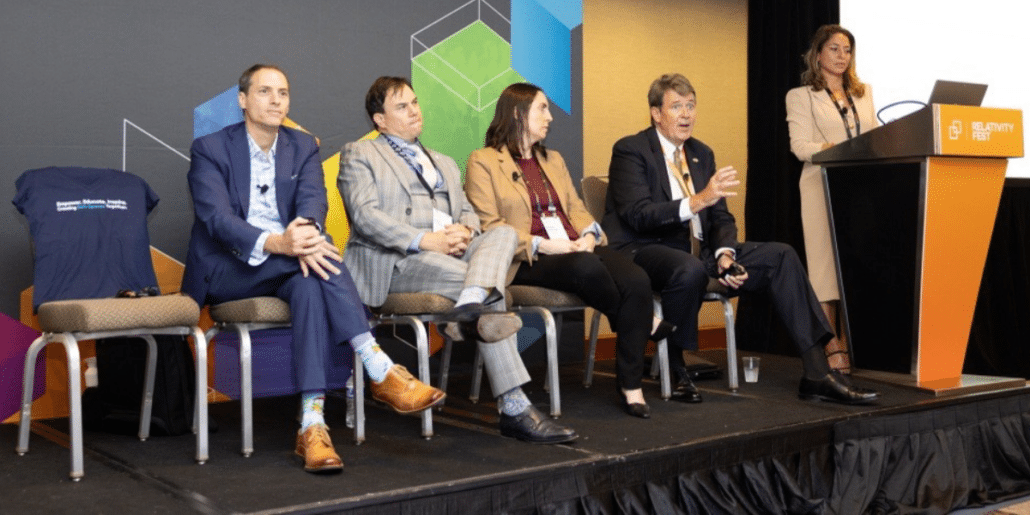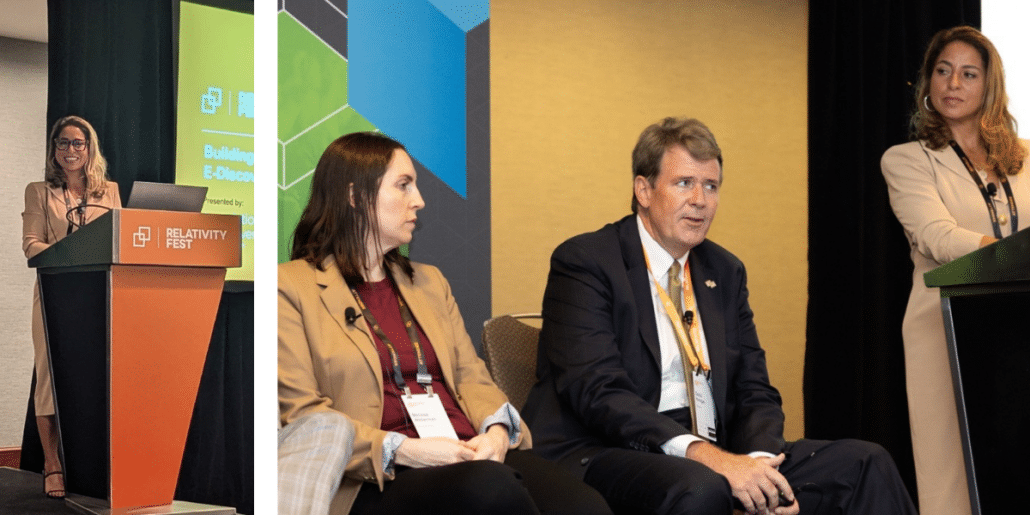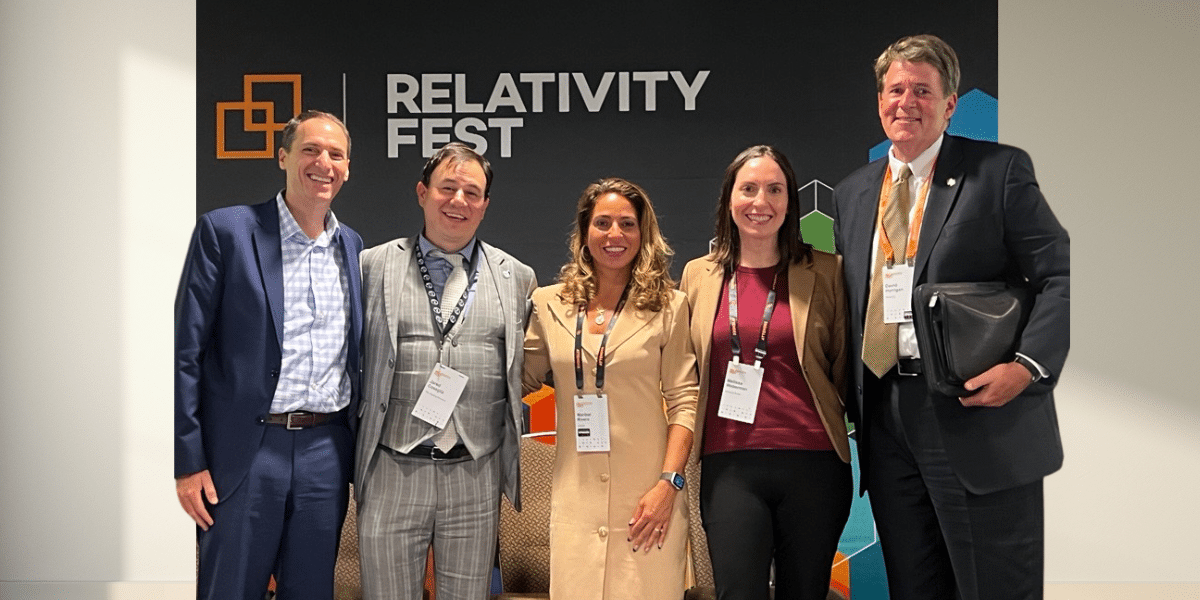At Relativity Fest Chicago 2024, I had the opportunity to moderate the ACEDS-sponsored panel discussion on the crucial subject of building e-discovery teams. Joining me for the session aptly titled “Building an Efficient E-Discovery Team” were Melissa Weberman, Counsel and Head of eData and Legal Technology at Arnold & Porter; Ari Kaplan of Ari Kaplan Advisors and the Chair of the ACEDS Advisory Board; David Horrigan, Discovery Counsel and Legal Education Director at Relativity; and Jared Coseglia, Founder and CEO of TRU Staffing Partners.
During our session, we engaged in a lively discussion with the audience – half of whom were managing teams, and over half were CEDS credentialed! – about the evolving role of eDiscovery teams. We explored the field’s past, present, and future, delving into strategies for cultivating high-performing teams, the significance of training and certifications, and the implications of generative AI.

A few key takeaways quickly rose to the top as we discussed the evolving role of eDiscovery teams.
- Successful eDiscovery teams require a blend of legal, technical, and project management expertise.
- The ability to acclimate to new technologies and workflows is paramount.
- Effective teamwork and communication are indispensable, so staying abreast of the latest tools and trends is essential.
These key takeaways are critical as the importance of eDiscovery across various disciplines within an enterprise continues to grow. David Horrigan stated, “Just because you are a data protection officer, just because you’re an eDiscovery analyst, doesn’t mean that you’re stuck there.”
David’s statement underscores the transferable nature of eDiscovery skills, applicable to a wide range of areas, including data privacy, cybersecurity, and information governance. With their expertise in data management, analysis, and preservation, E-discovery professionals are well-equipped to contribute to these adjacent fields.
We also discussed the importance of training and certifications for eDiscovery professionals. Melissa Weberman shared:
“As I mentioned before, a priority of mine has been getting folks educated in a number of different ways. I see value in different sorts of training, honestly. Our entire operational team went through CEDS certification. Our entire operational team has done all the Relativity trainings. They’ve done other technical trainings. I mean, for them, keeping up to date on the technical side is obviously critical. They’re getting updates from the managed services provider that we use constantly. That almost goes without saying. It’s the lawyers, I think, who in some ways have benefited more because they were coming in with all sorts of experience, from all sorts of places. And so nearly all of the lawyers on my team also are CEDS certified.[…] I’m always looking for those sorts of opportunities. But also internally at my firm, part of my role is training everybody, or at least the litigation and regulatory side, making sure everybody has some training.”
She, like all our panelists, firmly believes that continuous learning is critical for both technical and legal staff.
One of the key takeaways from our discussion was the importance of a common vernacular and baseline of knowledge for eDiscovery teams. This shared understanding is fundamental for effective communication and collaboration. Melissa Weberman drove home this point, stating, “I think so much of this work is just a common vernacular and making sure that when you’re talking about issues, when you’re making a request and fulfilling a request, that you’re actually talking about the same thing.”

In the past, eDiscovery teams may have functioned in isolation. Still, today, it’s imperative to break down those barriers and nurture communication and cooperation between different departments. This is especially important with the rise of new and evolving technologies like generative AI. Ari Kaplan noted that younger generations are often more at ease with the latest technologies, such as generative AI. He suggested that there is an opportunity for cross-generational collaboration, where younger team members mentor their older colleagues on new tools and techniques – a concept known as “mentoring up.” This reciprocal exchange of knowledge bridges the generational gap and cultivates a culture of continuous learning within the team. By harnessing the unique strengths of each generation, eDiscovery teams can become more adaptable and innovative.
The panel also discussed the concept of a “farming system” for developing eDiscovery talent. Jared Coseglia highlighted the need for the industry to find new ways to cultivate talent, stating, “Something’s got to change. Until it does, salary is going to go up, pricing is going to go up, everything’s going to continue to get more expensive, and our community is going to continue to reinvent but not expand.” This resonated with the audience, as traditional entry points, like document review, are evolving with the rise of technologies like generative AI. Identifying and nurturing new talent pathways is essential for the continued growth and success of the eDiscovery field.
The field of eDiscovery is constantly evolving, making it an exhilarating domain. By building efficient and adaptable teams, organizations can harness the power of eDiscovery to elevate their data management and compliance processes. As our discussion at Relativity Fest illustrated, the skills and knowledge honed in eDiscovery have far-reaching applications, extending to data privacy, cybersecurity, and information governance. This emphasizes why continuous learning and professional development are so vital in this field. By investing in training and certifications, such as those offered by ACEDS, professionals can remain at the forefront of advancements and ensure they possess the expertise to navigate the complexities of today’s data landscape.
I hope this post has prompted you to consider the role of eDiscovery in your organization and how you can cultivate a more efficient and adaptable team. By embracing collaboration, continuous learning, and groundbreaking technologies like generative AI, you can unlock the full potential of eDiscovery and propel innovation within your organization.

